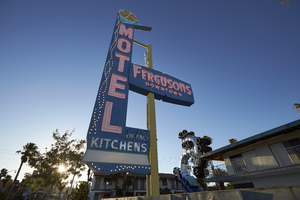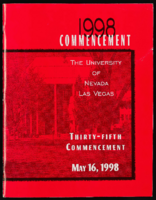Search the Special Collections and Archives Portal
Search Results

Meeting minutes for Consolidated Student Senate, University of Nevada, Las Vegas, August 7, 1979
Date
Archival Collection
Description
Text

Gene Noboru Nakanishi oral history interview: transcript
Date
Archival Collection
Description
Oral history interview with Gene Noboru Nakanishi conducted by Ayrton Yamaguchi, Cecilia Winchell, and Stefani Evans on April 2, 2021 for Reflections: The Las Vegas Asian American and Pacific Islander Oral History Project. Gene Nakanishi shares his detailed family history from both his father's and his mother's families. He discusses his paternal grandfather's work on the Union Pacific Railroad, the family's internment in Wyoming during World War II, and his father's release from the camp by joining the United States Army Signal Corps. Nakanishi also talks of his maternal grandfather who was of the Bushido ("warrior") class in Osaka, Japan, and his grandfather's work with Christian missionaries. He shares details of his mother's restaurant employment in Los Angeles and her opening of Osaka Japanese Bistro in Las Vegas in 1969. Nakanishi also talks about being born and raised in Las Vegas, his musical schooling at Berklee College of Music in Boston, and his graduate education at Harvard University. He discusses his work as a band teacher for the Clark County School District, his involvement in the Idyllwild Arts Summer Program band camp, and his interests in jazz music.
Text

Photographs of Fergusons Motel sign at sundown, Las Vegas (Nev.), June 28, 2017
Date
Archival Collection
Description
Site address: 1028 Fremont St
Sign owner: 1028 Fremont LLC (Assessor) /Downtown Las Vegas Project (Bruzda, 2016; Millward, 2017; Schoenmann, 2013; Snel 2014)
Sign details: The building was constructed in 1946 (Assessor). The business opened originally as the Franklin Motel (RoadsideArchitecure.com). The motel may have been renamed Ferguson's in 1962 (Las Vegas motels-Then and Now). The current sign probably dates from the late 1950's or 1960's and is not from the Franklin (RoadsideArchitecture.com). Downtown Project partners purchased Fergusons Motel in December 2012 and the property was closed as of 2013 (Schoennmann, 2013). The Downtown Project planned to convert the motel's 69 rooms into retail shops, offices, taverns and a restaurant (Schoenmann). As of May 2017, no construction had been completed and The Downtown Project had altered its plans to instead use the site for residences, restaurants and art space (Millward, 2017).
Sign condition: Condition is 5. The sign has been reconditioned to look like new.
Sign form: Pole
Sign-specific description: The sign is mounted on a rectangular metal pole which is painted yellow. Attached to the street side of the pole are several metal cabinets joined to form an "L" shape which points toward the motel. The bottom cabinet contains the word "KITCHENS", which runs horizontally in white painted sans serif letters and white sans serif skeleton neon letters. Below "KITCHENS" is a white plastic light box. Below the lightbox are two rows of intertwining clear light bulbs. The bottom of the metal cabinet is shaped like two undulating waves. Over the top of "KITCHENS" is a small cabinet which spells out "VACANCY" in white san serif letters which are covered by clear skeleton neon sans serif letters spelling out, "Sorry NO VACANCY". The word "MOTEL" runs vertically down the sign in white painted and white neon letters, all san serif. Neon tubes outline the letters while another tube runs down the center. Running down the street side of the sign are three intertwining rows of clear light bulbs. The top of the cabinet is painted green in the shape of a chevron or boomerang. The bottom sides of the boomerang intersect at a perpendicular angle and the top is curved. The tip of the boomerang juts out from the sign toward the hotel. The interior of the boomerang is traced by three rows of skeleton neon. On top of the boomerang is a yellow circle outlined in light blue. The blue outline contains 16 clear light bulbs. The yellow interior of the circle has 16 spiral rows of clear light bulbs running from the exterior to the interior of the circle. The yellow pole which supports the sign runs through a lozenge shaped blue metal cabinet. The cabinet states, "FERGUSONS" in Googie style white letters and skeleton neon and "DOWNTOWN" is sans serif white letters and skeleton neon. Above the cabinet, attached to a pole, is a white statue of a climbing figure which is similar to other figures on Fremont Street and was likely added to the sign by the Downtown Project.
Sign - type of display: Neon and incandescent
Sign - media: Steel and plastic. Possibly fiberglass for the climbing figure.
Sign - non-neon treatments: Incandescent light bulbs, light box
Sign environment: In the East Fremont district this motel is surrounded by other motels many of which are also currently closed.
Sign - date of installation: Circa late 1950's/ 1960's
Sign - date of redesign/move: The sign is probably from the late 1950's or 1960's (RoadsideArchitecture.com). A postcard from the 1960's shows the background of the "MOTEL" portion of the sign painted black (Garofalo, 2011). Below "FERGUSONS" hung two smaller signs: the top sign displayed the AAA symbol and the words, "Phone", "Pool" and "T-V" (Garofalo, 2011). The lower sign displayed three badges (auto clubs?).
Sign - artistic significance: The sign design style is Googie.
Survey - research locations: Bruzda, N. (2016 May 2). Construction planned for Fergusons Motel in downtown Las Vegas still yet to be seen. Las Vegas Review Journal. Retrieved from https://www.reviewjournal.com/business/construction-planned-for-fergusons-motel-in-downtown-las-vegas-still-yet-to-be-seen/ Clark County Assessor. Parcel No. 139-35-201-006. Retrieved from http://www.clarkcountynv.gov/assessor/Pages/PropertyRecords.aspx?H=redrock&P=assrrealprop/pcl.aspx Garofalo, M. (2011 November 1). Still standing-Fergusons[sic] Motel [Photograph]. Retrieved from https://www.flickr.com/photos/vintageroadtrip/6305057708/in/photolist-aBa4Zw-qeNAZa-fxWx3V-54q1dr-7qs1A1-81uYMJ-9i1MAF-pUfCjM-m57jkW-8BzGrN-nM1Nyq-zCCx9s-EJBciL-BkTrgS-zpiF94-aW6aKv-2ZFRQ4-opLfq5-riESKk-n8Wdz-qmMWgN-riESNg-FW15N3-dvx2N-7As5GF-aC7z44-omUMSx-qmMWKy-5XLHvx-evbtLo-onbi7i-635ftN-UhMyz7-8sfVoW-BVWgRY-m8qWB8-ev8mFD-6sadvS-8FdMPf-pBdbtQ-etP68R-pfCeRE-54HNiA-9uFAxg-3b4UbW-FWTWBt-pjCShX-8Bv6mp-aUDgVc-qUKBLu Las Vegas motels-Then and now. (n.d.) Retrieved from http://stefanidrivesvegas.com/2.html Millward, W. T. (2017 May 8). Plans to turn Fergusons Motel into mixed-use campus advance. Las Vegas Review Journal. Retrieved from https://www.reviewjournal.com/local/local-las-vegas/downtown/plans-to-turn-fergusons-motel-into-mixed-use-campus-advance/ RoadsideArchitecture.com. Fergusons Motel. Retrieved from http://www.roadarch.com/signs/nvvegas2.html Schoenmann, J. (2013 July 3). Joe Downtown: Ferguson Motel being converted into taverns, retail spaces. Las Vegas Sun. Retrieved from https://lasvegassun.com/news/2013/jul/03/joe-downtown-ferguson-motel-being-converted-tavern/ Snel, A. (2014 August 5). New plans proposed for rundown Fremont Street motel. Las Vegas Review Journal. Retrieved from https://www.reviewjournal.com/business/new-plans-proposed-for-rundown-fremont-street-motel/
Surveyor: Mitchell Cohen
Survey - date completed: 2017-08-16
Sign keywords: Steel; Plastic; Fiberglass; Incandescent; Pole sign; Neon
Mixed Content

University of Nevada, Las Vegas (UNLV) 35th commencement program
Date
Archival Collection
Description
Commencement program from University of Nevada, Las Vegas Commencement Programs and Graduation Lists (UA-00115).
Text

Ashley E. Nitz oral history interview: transcript
Date
Archival Collection
Description
Oral history interview with Ashley Nitz conducted by Claytee D. White on February 6, 2018 for the Remembering 1 October Oral History Project. In this interview, Ashley Nitz discusses her experiences attending the 2017 Route 91 Harvest music festival in Las Vegas, Nevada with a friend. She talks about making the weekend of the event a "staycation", where she stayed with her friend at the Trump Hotel. Nitz goes into detail on the Route 91 Harvest festival venue and the events of that Sunday night when the shooting began. She speaks of the lockdown in the Tropicana Hotel and the support given there to all of the survivors, such as water and medical aid, as well as her journey home once the lockdown was lifted. The interview ends with a discussion on life after the shooting.
Text

Transcript of interview with Elaina Blake by Stefani Evans and Claytee D. White, September 19, 2016
Date
Archival Collection
Description
Coming from humble beginnings, Elaina Blake grew up in Port Orchard, Washington, where her father was in the logging industry and she involved herself in the love of horseback riding. After becoming engaged at age 16, she married the following year at 17 and moved to Las Vegas where she started as a statistical typist at the Sahara Hotel and Casino. This led to a position her to become an executive secretary at the Thunderbird where she dealt with the rampant sexual harassment that was typical of the executive office environment in the industry at the time. The rejection of those advances led her to start her career in real estate with Roberts Realty where she sold her first group of homes off of Nellis Boulevard and Tropicana Avenue. In 1976, she made the entrepreneurial move by buying into Roberts Realty, becoming an owner, and eventually buying out Young American Homes. She started giving back to the community through her service as being the first woman elected to president elect for the Chamber of Commerce in 1984 and also served on the Clark County Planning Commission for four years serving as vice chairman and chairman. She did such a wonderful job running the chamber, she was approached to run for Lieutenant Governor. Her involvement with the community increased during this time as she got involved with the United Way, saved the YMCA from closure and started the Focus School Project in 1989 with former superintendent Brian Cram where businesses adopt schools and provide money and volunteer. This project is still in operation today and has given back $8 million dollars to CCSD in volunteerism. During her time with the Chamber, she continued to work with major local builders such as Pageantry Homes, Heers Brothers, and Christopher Homes, which led to her taking another entrepreneurial milestone by taking a small team to create Blake and Associates. In 1996, Blake leveled up to become a developer starting with office buildings. As a champion for the inclusion of women, she never felt held back because of her gender and she always encouraged women in the Chamber to give more of themselves, even if it was for ten minutes because the men did so. In a male-dominated industry, Elaina Blake has been a trailblazer for women in business and the housing industry in the valley.
Text

Transcript of interview with Robert & Patricia Campbell by Stefani Evans, November 28, 2017 & March 1, 2018
Date
Archival Collection
Description
In 1976, when Bob Campbell accepted the city manager position in Henderson, Nevada, he and his family had just endured nearly a month of sub-zero temperatures in their native Missouri. Southern Nevada's mild winter coupled with the promise of developing the 8,600 acres that would become Green Valley convinced Bob and his wife, Pat, to make the move. Bob came to Henderson with a degree in public administration and city manager experience in two Missouri towns, but Green Valley offered something akin to "an artist having a blank canvas on which to plan and create." In this interview, Bob talks about the ways his career in public administration blossomed in Southern Nevada. After about five years with the City of Henderson, Campbell joined Mark Fine and American Nevada Corporation to develop Green Valley; five years after that, he moved to Southwest Gas Corporation to work with Bill Laub and later, Kenny Guinn. From about 1989 to 1997, he helped develop Lake Las Vegas. In 1994, Bob and Pat together formed The Campbell Company, a private consulting firm whose clients included Transcontinental Properties' Lake Las Vegas project as well as Henry Chen's Ascaya. v Much of the interview focuses on the Lake Las Vegas project: its original visionary, false starts, and its tumultuous development as an arm of the Bass brothers of Fort Worth, Texas; their developer, Ronald Boeddeker of Transcontinental Properties in Santa Barbara, California, and Boeddeker's appointee, Alton Jones. Along the way Campbell shares the strategies employed by the Wednesday morning group of Henderson boosters who met at Saint Peter's Catholic Church and who succeeded in gaining the necessary local, state, and federal approvals to move the project forward. He reveals the intimidation, physical threats, and sexual harassment suffered by those who questioned the way Jones did business. Overall, though, he explains why he continues to respect the Bass brothers and is still proud of Lake Las Vegas, "proud that we got it on, and proud that it's turned out to be what it is."
Text

Transcript of interview with Gil Cohen by Claytee White, August 5, 2014
Date
Archival Collection
Description
Interview with Gil Cohen by Claytee White on August 5, 2015. In this interview, Cohen discusses growing up in Las Vegas and attending University of Nevada at Reno. He returned to Las Vegas to join the management training program at the Stardust. He talks about his friendships with Moe Dalitz and Carl Cohen, and his interest in golfing. He also discusses corporate ownership of casinos, unions, and his experiences working at different Strip hotels.
Gil Cohen came to Las Vegas in 1957, when was ten years old, when his father, Yale Cohen, was recruited by Moe Dalitz to work at the Stardust Hotel and Casino. Cohen graduated from University of Nevada Reno, and started working at the Stardust through the management-training program. In 1975, he was made hotel manager, his first of many leadership positions in Strip properties, which have included the Dunes, Aladdin, Hacienda and Monte Carlo, where he currently works as a casino host.
Text

Transcript of interview with Ron Lurie by Barbara Tabach, June 5, 2015
Date
Archival Collection
Description
Interview with Ron Lurie by Barbara Tabach on June 5, 2015. In this interview, Lurie discusses his family and his time in politics, campaigning for office, and some of his accomplishments while in office as mayor and in the city council. He also talks about growing up in Las Vegas and attending Las Vegas High School, and working for his father, Art Lurie, in the grocery store business.
Ron Lurie was a rambunctious teenager when the Lurie family moved to Las Vegas from California. He adapted quickly to Las Vegas and made fast friends. He is a 1958 graduate of Las Vegas High School. His father, Art Lurie, a supermarket businessman, was also a well-known professional boxing judge and a former Nevada Athletic Commission chair. In 1987 Ron became the first person of Jewish ancestry to be elected Mayor of Las Vegas. Previously, he was fourteen year member of the Las Vegas City Council and served on many community boards and commissions. Since political office was not a fulltime position, Ron's career path developed in a couple of different ways. He tells the story of becoming a butcher and the opportunities he experienced becoming a successful salesman of gaming machines for Si Redd, IGT and others. His over three decade gaming career continues as of this oral history. He is executive vice president and general manager of Arizona Charlie's Decatur location. In this oral history he reflects on some of his political accomplishments as mayor and city councilman. He also served six years on the State of Nevada Wildlife Commission and is a member of the Fraternity of the Desert Bighorn.
Text
Jamie Ross (PACT Coalition for Safe and Drug-free Community) oral history interview conducted by Kelliann Beavers and Elia Del Carmen Solano-Patricio: transcript
Date
Archival Collection
Description
From the Lincy Institute "Perspectives from the COVID-19 Pandemic" Oral History Project (MS-01178) -- Community organization interviews file.
Text
